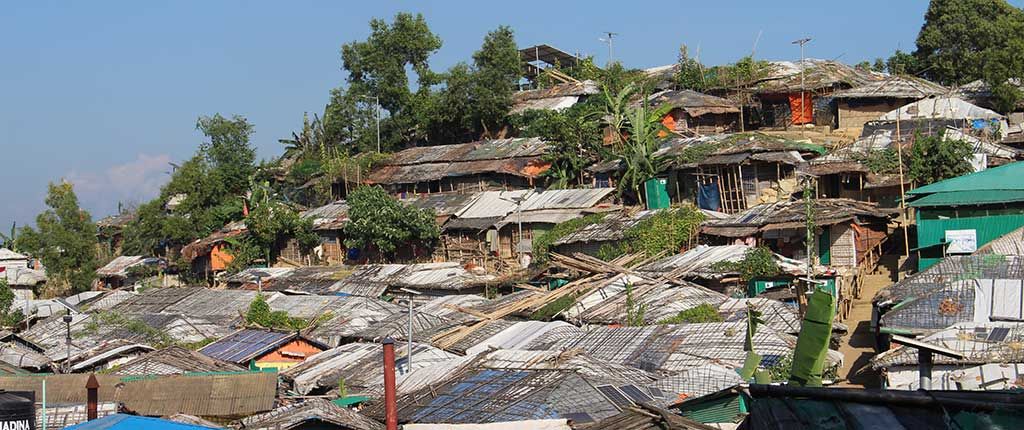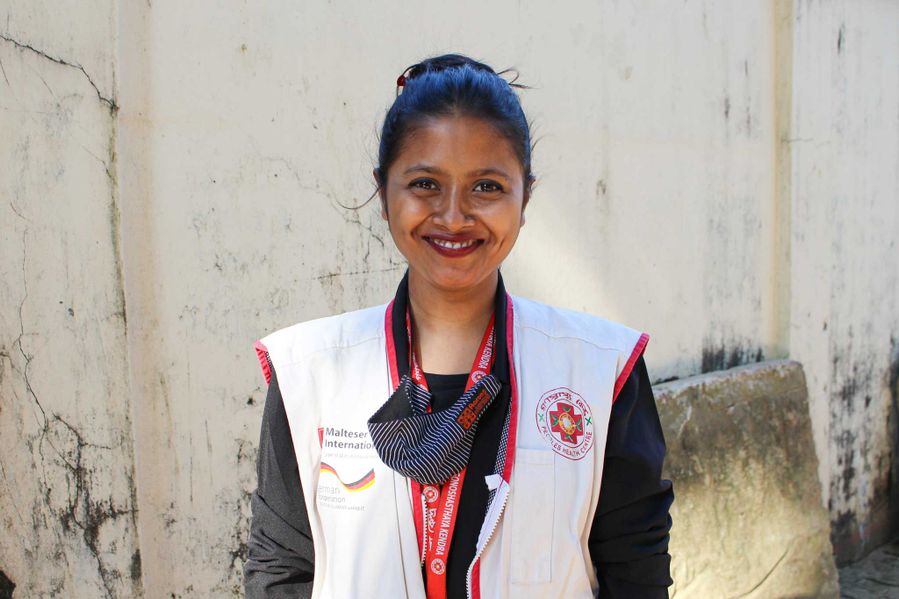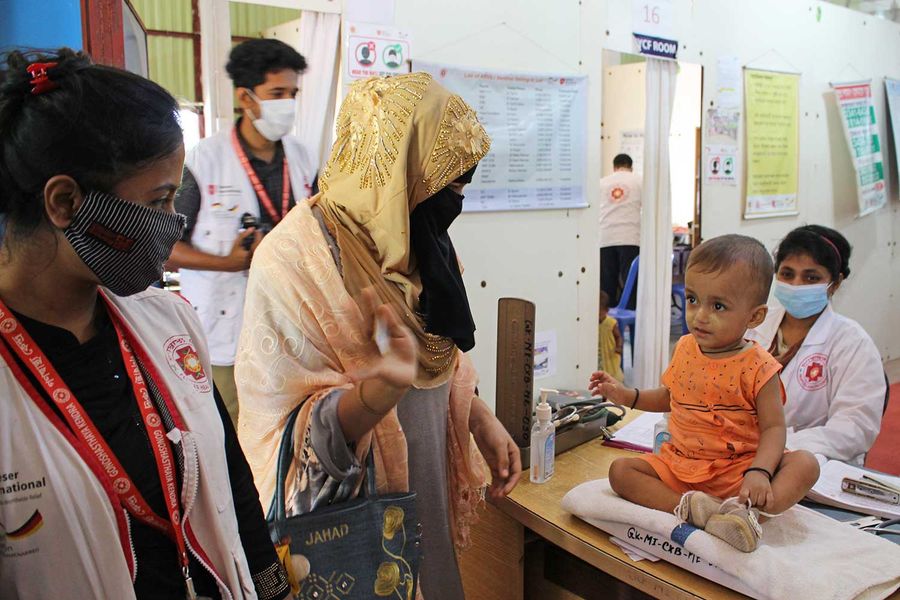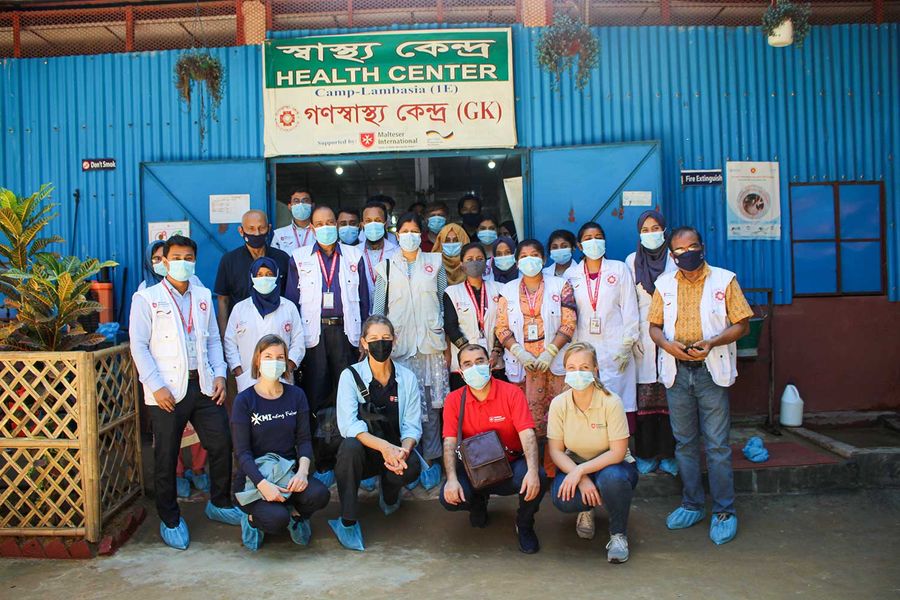
Clinic manager in the world's largest refugee camp - Interview with Dr. Sadia Afroz
For almost three years, Dr. Sadia Afroz has been working in the world's largest refugee camp in Cox's Bazar in Bangladesh. As clinic manager in one of the three health stations of our local partner organization Gonoshasthaya Kendra (GK), she is dedicated to improving the health of the Rohingya on a daily basis. We talked to her about her work, the challenges on the ground, the state of health of the refugees and her motivation.

Why did you become a clinic manager at a
health clinic in the Rohingya refugee camp?
Dr. Sadia Afroz: I love working with children, expectant mothers and the elderly. They are the most vulnerable and need our special protection. When I completed my MBBS (Bachelor of Medicine, Bachelor of Surgery) course at GK Medical College in 2018, I decided that if I wanted to do what I love most - assist people in need - I had to go to Cox's Bazar. Gonoshasthaya Kendra gave me the opportunity to work in the refugee camps and so I started my job as a clinic manager in one of the three health clinics supported by Malteser International in the camps.
What challenges did you face when you began
your work as a clinic manager?
At the beginning, I faced many challenges. As a female clinic manager in a refugee camp, in a religious context, in an environment with many men, was very challenging. But I embraced these challenges and was eager to overcome them - to make it easier for myself and also to make the persons who come to me more comfortable. For example, the influencers in the camps are mostly male. They are called Majhis. As a clinic manager, interacting with the people in the camp is very important. Sometimes we need to get feedback from the communities through the Majhis. However, in the beginning they didn't want to set up meetings with me. They probably thought "Oh, this is a woman, I don't need to talk to her. What can she do for us?". So, I started talking to the people in the camp. Whenever I consulted and treated patients, I talked to them and listened to them patiently. I also went to the communities and exchanged ideas with the people there. And day by day, they opened up to me more and began to trust me. When I had another meeting with Majhis at the health facility after about six months, they approached me and shared their concerns and stories with me. This showed me that if you want to overcome a challenge, you have to go through it and solve it yourself. There is no way around it.
So you learned the Rohingya language? What was that experience like?
When I first started learning the language, I must have sounded like a baby talking. When people came to me and I spoke in their language, they laughed at me. But they still understood me and saw that I was trying to learn their language. That's why they came to me and got close to me. After a few months I mastered the language, and now I can speak fluently with patients.
When you first started your job, how was the health situation of the people in the camp and how is the situation now? Has something changed? Which problems do you see very often?

When I started consulting patients, I noticed that only few pregnant women were coming to the health post. They had so many barriers. As a result, many women faced difficulties during the delivery. Since they were not examined and educated during pregnancy, they did not learn about danger signs during pregnancy and other pregnancy-related complications. We thought intensively about how we could improve this situation. It was clear that we could not solve the problem alone. But we could take some initiative. So through our outreach team, we provided awareness raising activities. We hired traditional birth attendants from the Rohingya community because the women feel more comfortable when they are accompanied in pregnancy by someone from their community. So the TBAs (Traditional Birth Attendants) came to our health facility and we started to train them, for example, by showing them pictures of danger signs, talking to them about problems that can occur in home delivieries and how we can help in the hospital. And we were happy to see that the number of facility-based deliveries increased.
Another big problem that we see very often is skin diseases due to the shelter situation. People live very close to each other in the camp. There are at least 5 to 10 people living in a house, so skin diseases are quickly passed from one person to another. Access to clean water, hygiene and sanitation is also poor. This makes it difficult to remove it at all.
What about the mental health of the Rohingya living in the camps?
All the people here in the camp have experienced terrible things and have faced traumatic situations as so many people were killed in Myanmar. Many people have lost the people closest to them, their husbands, wives, their children. When they come to our facility and talk to us about their physical health problems, many people often become very emotional and start crying. We then send them to our psychologists. Because health is a compact package. Mental health, physical health and overall well-being depend on each other. So if we only treat the physical problems and disregard mental health, there will not be a complete cure. That's why we also offer psychosocial support at our healthcare facility.

Who receives services at your health facility?
We not only provide free health services to the Rohingya population, but also to Bangladeshi host communities living close to the camps. This is important to promote peaceful coexistence among the communities. Whenever host community members come to our health post, they receive all services free of charge and it is important for us to show that they are welcome here. We don’t want to evoke the feeling that the service is only for the refugees, because it’s not. Only together with the people of Bangladesh can we ensure peaceful coexistence. We therefore treat all patients equally and are pleased that the local population also regularly uses our services.
What are difficult moments for you personally
in your day-to-day work?
It’s hard to live so far from my family. My mother is a dialysis patient. When she needed emergency treatment, or when she wants to see me or gets emotional, it is too far for me to visit her spontaneously. In such moments, it is not easy for me. But I have been able to set things up for my mother in the past years. My family is my other responsibility alongside my job. And I know that if I take good care of my patients, someone else will also take good care of my mother.n.
Who is your support system?
This is my husband. He supports me a lot and has never stopped me. He trusts me. As a clinic manager, I have to take care of administration, human resources, communications, represent the organization, go to meetings and liaison with different stakeholders. So the days are often long. But he is understanding and has never complained. On the contrary. I am currently doing my Master of Public Health, and he supports me in that as well. He gives me energy and strength to continue standing up for people in need.
What would you like to say to people who want to support your work and the people in the refugee camps? How can they help?
This is a mega camp, the largest refugee camp in the world. People have been living here for more than 4 years now. Donations are still needed to help with the ongoing challenges that the people in the camp face. Bangladesh cannot provide food and shelter for all these people on its own. It also needs the support of aid organizations like GK and Malteser International. Because only together can we stand by these people and help them.
The interview was conducted in November 2021.
Our work in Bangladesh
In order to improve conditions for people in the overcrowded refugee camps, we have been on the ground since the beginning of the crisis, providing vital assistance in the areas of health, water, hygiene and nutrition for refugees and host communities. Thanks to the financial support of the German Federal Foreign Office and Aktion Deutschland Hilft e.V., we are able to enable the operation of three health stations of the Bangladeshi organization Gonoshasthaya Kendra (GK). In addition to the comprehensive financing of the health stations, we support the implementation as well as the administrative and technical management of the project in order to strengthen the capacities of our partner organization and to ensure the quality of the services.








